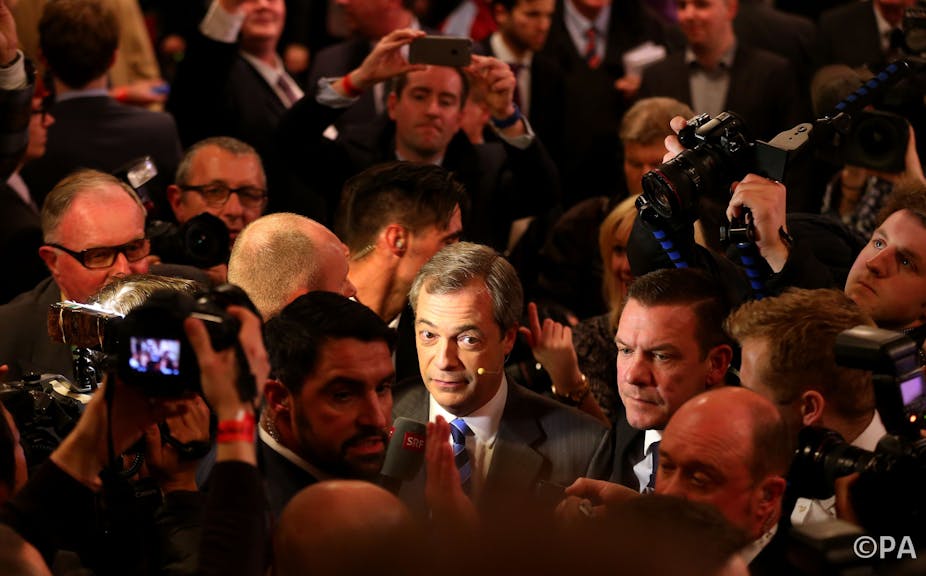Nigel Farage has claimed his comments about repealing racial discrimination legislation in the workplace were “wilfully misrepresented”. Viewers can see his remarks in context in the Channel 4 documentary Things We Won’t Say About Race That Are True.
Whether the political and media furore represented fair comment or rough treatment is a matter for debate, but UKIP may well experience more critical media appraisal of this kind as the 2015 election proceeds. This level of attention is unprecedented for UKIP, but it won’t necessarily be a disadvantage to the party.
Sitting on the sidelines
Loughborough University’s Communication Research Centre has monitored the reporting of every UK general election since 1992. Our data shows that UKIP’s principal problem in media terms for many years was neglect rather than negativity.
Although Europe was one of the most prominent issues in the 1997 media campaign, UKIP’s thunder was stolen by James Goldsmith’s Referendum Party. In the 2001 election, UKIP representatives accounted for 0.05% of the party political sources identified in our sample of leading news programmes and main press news sections. This figure rose to to 0.4% in 2005. At the start of the 2010 election, Farage promised the “edgiest campaign in British political history”, but UKIP still only accounted for 0.6% of the party political sources reported.
This marginalisation in the media was also evident outside general elections. Researchers from Cardiff University examined two months of the BBC’s coverage of immigration, religion and the UK’s relationship to Europe in 2007 and 2012, as part of the BBC Trust’s appraisal of the breadth of opinion in its coverage. They found UKIP’s presence fell between the two sample periods, from 2.7% of the party political sources featured to 1.4%. This pattern was replicated in commercial broadcast coverage.
Hitting the headlines
Recently, things have changed considerably. Additional analysis we have undertaken of the past 28 days of the 2014 European parliamentary election found that UKIP attracted 4.25 times more national press coverage than it achieved in the last four weeks of the 2010 general election. UKIP also featured very prominently in broadcast coverage of the campaign. This cannot be dismissed as a flash in this particular EU electoral pan. In their comprehensive study of the UKIP “revolution”, Robert Ford and Matthew Goodwin found a 290% increase in UKIP related newspaper coverage between 2011 and 2013, with the biggest step-change occurring in 2013.
The party’s increased newsworthiness reflects a confluence of factors. It has professionalised its campaigning activities since the last general election, investing considerably in publicity and vetting representatives to try to prevent them from embarrassing the party (though this doesn’t always pay off).

UKIP has also developed a broader populist political narrative, connecting its anti-integration stance with public anxieties about both immigration and the integrity of traditional political parties. It has also finally found a telegenic leader, whose avuncular manner and routine deployment of beer and cigarettes offers a classic example of “the manipulation of ordinariness” commonly found with populist political parties.
All these developments have helped give UKIP an electoral momentum that has become impossible for news organisations to ignore. Ofcom designated UKIP as a “major party” in England and Wales for the 2014 European and 2015 general election campaigns. This ruling requires commercial broadcasters to give UKIP equivalent prominence to the other main political parties in constituency reporting and additional party election broadcasts.
UKIP’s advances have also created more than a frisson of interest among some very senior media figures, most notably Richard Desmond, owner of the Express group, who pledged £300,000 to UKIP in late 2014 and appointed the UKIP peer, Lord Stevens, as deputy chair of the Express group. The main political parties are also now tackling the UKIP insurgency more urgently and directly, which has also stimulated additional media interest.
United against UKIP
Our analysis of national press coverage during the 2014 European elections shows that 47% of the coverage that focused on UKIP highlighted negative issues concerning the party’s policies, personalities and/or performance. A further 17.5% of the items reported claims about the party’s racist, xenophobic and/or religiously intolerant tendencies. Another 7% of items presented other instances of sexist or homophobic statements by UKIP representatives. Other gaffes, indiscretions and electoral difficulties accounted for a further 18.5% of UKIP-focused coverage.
What is particularly striking is the convergence in the patterns of coverage found for ideologically divergent newspapers. For example, The Sun was just as ready as The Daily Mirror to accuse the party of racist or xenophobic attitudes. The sole outliers were the Express newspapers, which made considerably less mileage out of the party’s pratfalls and prejudices.
In the face of criticism
Farage has frequently complained about UKIP’s treatment by the mainstream media, which he sees as indicative of journalists’ complicity in supporting the political status quo. But the increased intensity and negativity in coverage UKIP need not necessarily work to the party’s detriment. A major comparative study of media and neo-populist parties concluded that “any media coverage advances contentious political figures” by enhancing their visibility and conferring “public legitimation”.
The resilience of UKIP support despite trenchant editorial critique challenges traditional assumptions about the power-broking role of national news organisations. Matthew Goodwin argues that this reveals a profound disconnection between the mainstream news media and many sections of UKIP supporters. Indeed, such derision may actually strengthen the party’s appeal to people who see the political and media classes as complicit in creating an establishment hegemony and failing to represent their concerns and anxieties.
This poses a particular challenge to populist news organisations, whose legitimacy – and financial viability – is dependent upon their ability to claim an empathetic connection with “ordinary people” and their everyday concerns. If the UKIP bandwagon continues to roll, the current disdain of most right wing populist newspapers may prove difficult to sustain after this year’s general election.

